May 2, 2017
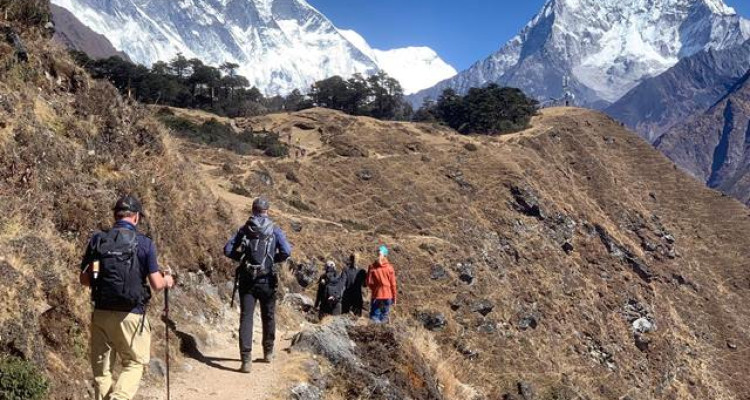
Hiring a guide and porter in Nepal is a common practice for trekkers and hikers who are planning to explore the vast Himalayan range. A guide is an experienced and licensed professional who helps you navigate the trekking route, provides valuable information about the local culture and geography, and ensures your safety during the trek. A porter, on the other hand, is responsible for carrying your backpack and other essential gear, leaving you free to enjoy the trek without being weighed down by heavy loads. When hiring a guide and porter in Nepal, it’s important to choose a reputable agency that provides licensed and experienced professionals who speak your language and have a good understanding of the trekking route. It’s also essential to negotiate fair wages and ensure that your guide and porter are adequately equipped for the journey.
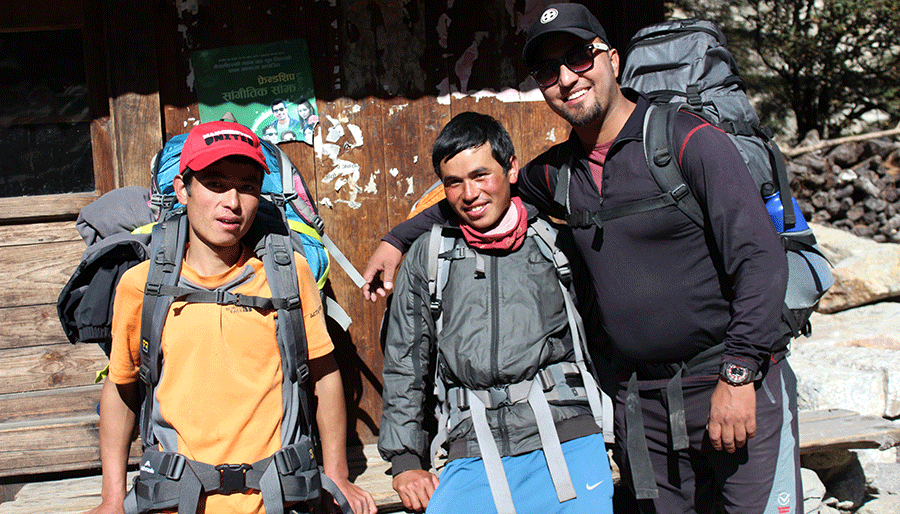
Guides and porters are essential members of the trekking community in Nepal. Guides are licensed professionals who have extensive knowledge of the local geography, culture, and language. They are responsible for guiding trekkers along the trekking routes, ensuring their safety, and providing them with information about the region they are visiting. They also help trekkers acclimatize to the altitude, and in some cases, provide first aid.
Porters, on the other hand, are responsible for carrying the trekkers’ luggage and equipment during the trek. They are often from the local communities and have an excellent understanding of the terrain and weather conditions. They can carry up to 30 kg of weight on their back, allowing trekkers to hike with just a small daypack. This not only makes the trek more comfortable but also reduces the risk of injury or exhaustion.
Guides and porters work together to ensure that trekkers have a safe and enjoyable trekking experience in Nepal. They are an integral part of the trekking industry and are valued for their expertise and hard work.
Hiring a guide and porter in Nepal has several benefits:
Hiring a guide and porter in Nepal is an important decision as it can greatly impact your trekking experience. Here are some steps to help you hire a guide and porter in Nepal:
By following these steps, you can hire a reputable guide and porter in Nepal and enjoy a safe and enjoyable trekking experience in the beautiful Himalayan mountains.
There are no formal qualifications required for hiring a guide and porter in Nepal. However, it’s essential to ensure that they have the necessary experience and skills to make your trekking experience safe and enjoyable. Here are some factors to consider when hiring a guide and porter in Nepal:
The cost of hiring a guide and porter in Nepal can vary depending on several factors, such as the duration of the trek, the level of experience and expertise of the guide and porter, and the season of the trek.
On average, the cost of hiring a guide in Nepal can range from $25 to $40 per day, depending on their level of experience and expertise. A porter can cost between $15 to $25 per day, depending on the weight of the load they carry.
If you choose to hire a guide and porter through a trekking agency, the cost may include additional expenses such as accommodation, meals, and transportation. In this case, the cost can range from $50 to $100 per day, depending on the level of service and the duration of the trek.
It’s worth noting that it’s possible to find cheaper options by hiring a freelance guide and porter directly, but it’s important to ensure they have the necessary qualifications and experience to ensure your safety during the trek.
In Nepal, it is required by law to hire a licensed guide and porter for certain trekking areas, including the Everest, Annapurna, Langtang, and Manaslu regions. The licenses are issued by the Nepal Tourism Board and are designed to ensure that the guides and porters are trained and qualified to provide safe and reliable services to trekkers.
When hiring a guide and porter in Nepal, it’s important to ensure that they have the necessary licenses and permits. You can verify this by checking their credentials with the Nepal Tourism Board or the trekking agency through which you are booking their services.
It’s also important to note that the guide and porter you hire should be insured. This is not only for their protection but also for yours, as they will be responsible for carrying your gear and providing guidance during the trek.
In addition, there are rules and regulations that must be followed when trekking in Nepal, including staying on designated trails and respecting the environment and local communities. Your guide and porter should be familiar with these regulations and ensure that you comply with them during your trek.
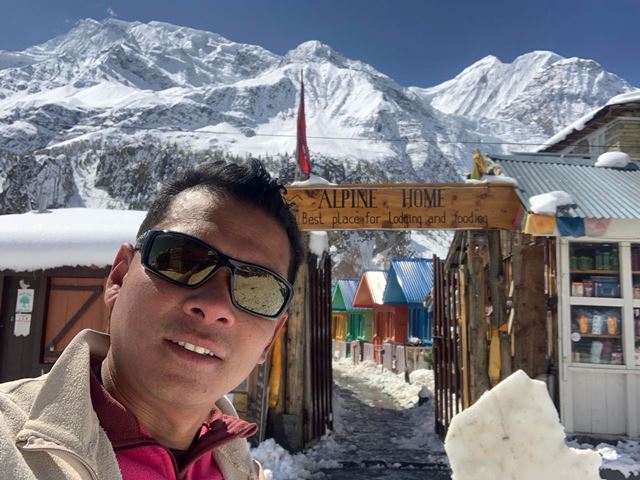
The best Round Annapurna trek 2023
Guides and porters in Nepal are an essential part of the tourism industry and play a crucial role in ensuring the safety and enjoyment of trekkers. As such, there are several benefits that they may receive, including:
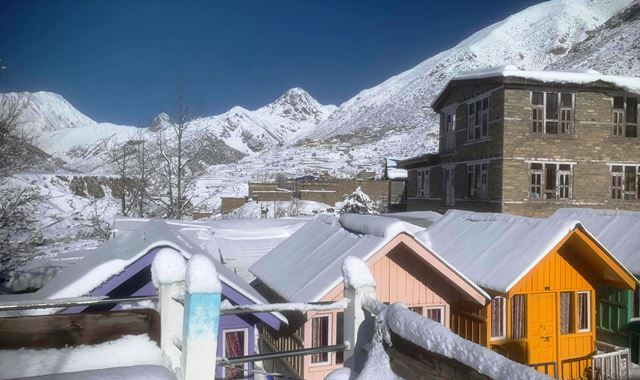
Annapurna Circuit trekking
When hiring a guide and porter in Nepal, there are several safety measures that you should take to ensure a safe and enjoyable trekking experience. Here are some important things to keep in mind:
By taking these safety measures, you can help ensure a safe and enjoyable trekking experience in Nepal.
Hiring a guide and porter in Nepal can offer several advantages for trekkers. Here are some of the benefits of hiring a guide and porter:
Overall, hiring a guide and porter in Nepal can offer several advantages that can enhance your trekking experience and ensure your safety and well-being.
Guides and porters play important roles in the trekking industry of Nepal and require different sets of skills and experience.
Skills and Experience for Guides in Nepal:
Skills and Experience for Porters in Nepal:
Both guides and porters should have experience working in the mountains of Nepal and should be able to provide references from previous clients or employers. It is also important that they are properly trained and licensed by the relevant authorities.
Negotiating fair wages for guides and porters in Nepal is important to ensure that they are paid what they deserve for their hard work and expertise. Here are some tips on how to negotiate fair wages:
Do your research: Find out the average wages for guides and porters in the area you will be trekking. This will give you a good idea of what to expect and what is reasonable.
Communicate clearly: When negotiating, be clear about what you are willing to pay and what you expect in return. Also, be clear about the scope of work and the responsibilities of the guide or porter.
Be respectful: It’s important to remember that guides and porters in Nepal work in a challenging environment, and their job is physically demanding. Treat them with respect and acknowledge their expertise and hard work.
Consider offering incentives: In addition to fair wages, consider offering incentives such as bonuses, tips, or extra time off.
Use a reputable trekking company: If you are booking through a trekking company, choose one that is reputable and follows ethical practices. Reputable companies will ensure that their guides and porters are paid fair wages and treated with respect.
Be willing to negotiate: Negotiation is a two-way process, so be open to suggestions and willing to compromise. If you are not able to reach an agreement, consider finding another guide or porter who is willing to work for the wages you can offer.
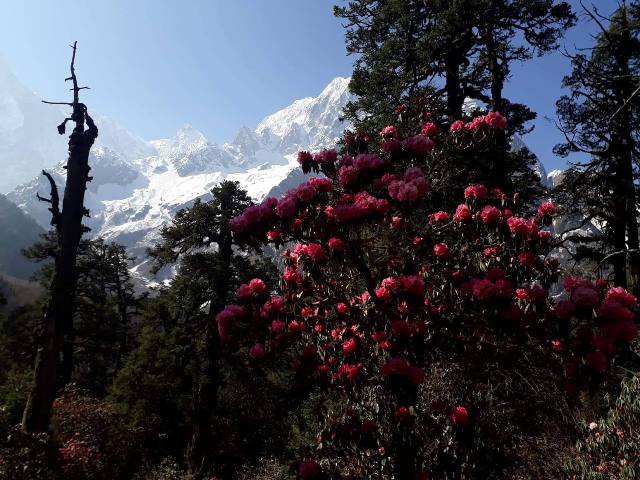
Ghorepani trekking- spring season
Tourism plays a significant role in Nepal’s economy, and the guide and porter communities are crucial to its success. Nepal is home to some of the world’s most breathtaking mountain landscapes, including the Himalayas, which draw tourists from around the world. These tourists require guides and porters to assist them in their trekking expeditions, providing employment opportunities for the local communities.
The impact of tourism on the Nepalese guide and porter communities has been both positive and negative. On the one hand, tourism has provided employment opportunities for the locals who work as guides and porters. It has also helped to improve the living standards of these communities by increasing their income and providing access to basic amenities such as healthcare and education.
Furthermore, the influx of tourists has led to the development of infrastructure in remote areas, such as roads, bridges, and trekking trails. This has not only made it easier for tourists to access the area but also for locals to transport goods and services.
However, tourism has also had negative impacts on the guide and porter communities. The work of being a guide or porter is physically demanding and often involves long hours and low wages. This can lead to exploitation, with some guides and porters being paid less than the minimum wage or being forced to work in unsafe conditions.
Moreover, the growing number of tourists has put pressure on the environment, leading to issues such as littering, pollution, and overcrowding. This has led to degradation of natural resources, such as forests and water sources, which are essential to the livelihoods of the guide and porter communities.
In conclusion, while tourism has brought significant benefits to the Nepalese guide and porter communities, there are also negative impacts that must be addressed. Sustainable tourism practices should be encouraged to ensure that the benefits of tourism are maximized, while minimizing the negative impacts on the environment and the communities involved.
Being a guide or porter in Nepal is a physically demanding job that requires extensive knowledge of the region’s geography, culture, and language. It is essential to understand the risks and responsibilities involved in this profession to ensure the safety and well-being of both tourists and locals.
Risks:
Responsibilities:
In conclusion, being a guide or porter in Nepal comes with significant risks and responsibilities. It is crucial to prioritize safety, navigation, environmental conservation, cultural awareness, and respect for human rights to ensure a successful and sustainable tourism industry.
In Nepal, the government has established training and certification requirements for guides and porters who work in the tourism industry, particularly for trekking and mountaineering activities. The aim of these regulations is to ensure that the workers in this industry are trained, qualified, and able to provide safe and quality services to the visitors.
Here are the training and certification requirements for guides and porters in Nepal:
Guide Training: To become a certified guide in Nepal, individuals must complete the following:
Porter Training: To become a certified porter in Nepal, individuals must complete the following: Minimum age of 16 years
Certification: After completing the required training and passing the tests, guides and porters can obtain certification from the Ministry of
It is worth noting that some trekking companies in Nepal have their own training programs for their guides and porters, which may exceed the minimum requirements set by the government. Additionally, some companies require their guides and porters to hold certain types of certifications, such as Wilderness First Responder, to ensure the highest level of safety and quality for their clients.
In summary, to work as a guide or porter in the trekking and mountaineering industry in Nepal, individuals must complete the required training, hold a valid First Aid certificate, and pass the written and practical tests conducted by the NATHM. Upon completing these requirements, they can obtain certification from the Ministry of Tourism and Civil Aviation, which is valid for two years and can be renewed upon completing refresher courses and passing the required tests.
Unfortunately, there have been several instances of scams and safety concerns related to guide and porter services in Nepal. Some of the common scams include overcharging for services, not providing agreed-upon services, and theft.
To avoid these scams, it is recommended to book through a reputable agency and to verify the credentials of the guide or porter. It is also important to clarify all the details of the services beforehand and to make sure everything is in writing.
Safety concerns include the risk of altitude sickness, which can be fatal if not properly managed. It is important to choose experienced guides who are trained in altitude sickness prevention and treatment. Other safety concerns include weather-related hazards, such as avalanches and landslides, which can be mitigated by following local advice and weather forecasts.
When working with Nepalese guides and porters, it is important to be aware of cultural norms and expectations to establish a respectful and positive working relationship. Here are a few key points to keep in mind:
Overall, demonstrating respect, humility, and openness to learning about Nepalese culture can go a long way in building a positive and successful working relationship with Nepalese guides and porters.
The COVID-19 pandemic has had a significant impact on the employment of guides and porters in Nepal. Many of these workers are from rural areas and come from low-income families. In Nepal, it is primarily men who work as guides and porters, while women are often engaged in farming and household duties. Without income from the tourism industry, these workers have faced tremendous difficulties in providing for their families, paying rent, and covering their children’s education expenses.
The COVID-19 pandemic has caused a prolonged gap in tourism in Nepal, which has made it challenging for these workers to earn a livelihood. For guides and porters, particularly during the pandemic, their livelihood has been severely impacted, leaving them with limited options for income. This has created significant financial strain and hardship for these workers who have struggled to take care of their families and meet their basic needs.
Trekking in Nepal can be an incredible experience, but it’s important to decide whether to trek with a guide or independently. Trekking with a guide provides numerous advantages. Firstly, a guide can provide you with valuable information about the local culture, history, and geography, which can enhance your overall trekking experience. They can also help you navigate through the trails, ensuring that you don’t get lost and that you stay safe. In addition, a guide can assist you in case of an emergency and provide you with first aid if necessary. Furthermore, trekking with a guide can allow you to experience the local culture more intimately by providing you with the opportunity to interact with locals and participate in cultural activities.
On the other hand, trekking independently can provide you with more freedom and flexibility to choose your own itinerary and pace. You can also save money by not having to pay for a guide or a porter. However, trekking independently requires more preparation and research beforehand to ensure that you have all the necessary equipment, permits, and knowledge of the trails. It’s also important to be self-sufficient and have the ability to deal with any unforeseen circumstances that may arise during the trek. Additionally, trekking independently can be more challenging for those who are not experienced in trekking, as it requires more physical and mental strength.
Guide and porter employment in remote Nepalese communities has significant economic and social impacts. Many remote communities in Nepal rely on tourism as a major source of income, and mountaineering expeditions provide an important economic opportunity for local people. Employment as guides and porters allows individuals to earn a sustainable income and support their families, which helps to reduce poverty in these communities.
In addition to economic benefits, guide and porter employment can have positive social impacts. It provides opportunities for skill development and education, as many individuals in remote communities may not have access to formal education or training programs. Moreover, it can empower women by providing them with income-generating opportunities and helping to challenge traditional gender roles.
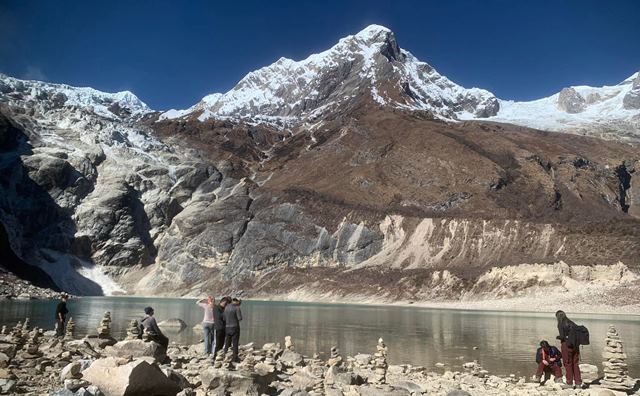
Ice Lake in Annapurna trek
Guides and porters have played a critical role in the history of Nepalese mountaineering expeditions. Mountaineering has been an important aspect of Nepal’s economy since the early 20th century, and the country has produced some of the world’s most renowned mountaineers, such as Tenzing Norgay and Ang Rita Sherpa.
Guides and porters are essential to any mountaineering expedition as they provide logistical support, carry gear and supplies, and assist climbers in navigating difficult terrain. In Nepal, Sherpas, who are an ethnic group native to the Himalayan region, have traditionally served as guides and porters for mountaineering expeditions.
Sherpas are known for their strength, endurance, and ability to acclimatize to high altitudes. They have played a pivotal role in many successful mountaineering expeditions, including the first successful ascent of Mount Everest in 1953 by Tenzing Norgay and Sir Edmund Hillary.
In addition to providing physical support, guides and porters also serve as cultural liaisons for foreign climbers. They help climbers navigate the complexities of Nepalese culture and customs and provide valuable insight into the history and traditions of the local people.
Guides and porters have also been instrumental in promoting the sustainable development of mountaineering tourism in Nepal. The Nepalese government has implemented regulations to ensure that mountaineering expeditions are conducted in an environmentally responsible manner and that the rights of guides and porters are protected.
Overall, guides and porters have been crucial to the success and sustainability of Nepalese mountaineering expeditions, and their contributions are an essential part of the country’s mountaineering heritage.
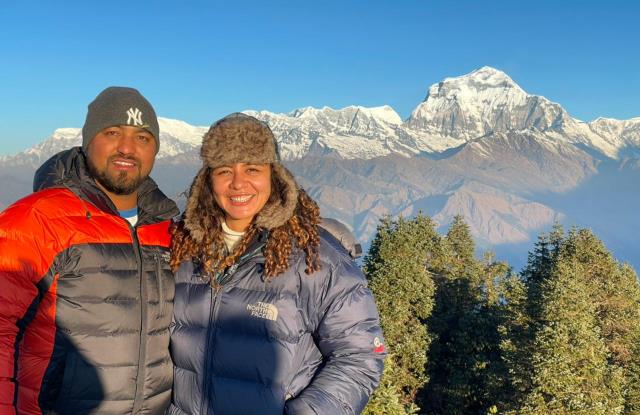
Poon hill trek in 2022
Nepaleverestguide.com is a great resource for anyone planning a trek or tour in Nepal. Santu, the website’s operator, is an experienced and knowledgeable local guide with over 18 years of experience. His website offers a variety of trekking and tour packages that cater to different interests and budgets. With customized itineraries based on individual preferences and needs, Santu ensures that his clients have an unforgettable experience in Nepal.
Safe Holiday Adventure Pvt. Ltd. is another reputable travel agency based in Nepal that offers trekking, tours, and adventure activities. Their team of licensed and experienced guides provides a personalized service to their clients and ensures their safety and comfort. Safe Holiday Adventure Pvt. Ltd. offers a range of packages, including popular treks like Everest Base Camp Trek, Annapurna Circuit Trek, and Upper Mustang Trek, as well as cultural tours, wildlife safaris, and adventure activities such as bungee jumping, rafting, and paragliding.
It’s important to choose a reputable travel agency and guide when planning a trip to Nepal, as this ensures a safe and enjoyable experience. By booking with Nepaleverestguide.com or Safe Holiday Adventure Pvt. Ltd., you can rest assured that you are in good hands. Their packages cater to a variety of interests and budgets, making them a great option for anyone planning a trip to Nepal in 2023.
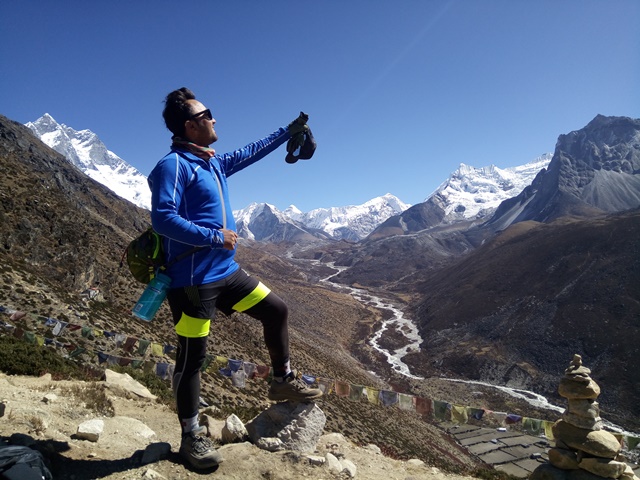
Everest base camp and Kalapthar trek 2021
Tipping in Nepal is a common practice, especially in the tourism industry. While there is no fixed amount for tipping, the general guideline for tipping guides and porters in Nepal is as follows:
However, these amounts may vary depending on various factors, such as the length of the trek, difficulty level, and the quality of service provided by the guide or porter. It is also important to consider the local cost of living when determining the amount to tip.
When tipping, it is recommended to give the tip directly to the person who provided the service. If you are not sure how much to tip, you can always ask your trekking company or other travelers for advice. It is also important to remember that tipping is a gesture of appreciation, so it should always be given with a smile and a thank you.
In summary, hiring a guide and porter in Nepal can greatly enhance your trekking experience by providing valuable insights, ensuring safety, and easing the physical burden of the trek. It is important to choose a reputable and experienced provider, discuss pricing and tipping expectations, and consider the level of support and services provided. Tipping around 8-10 USD per day for a porter and 10-15 USD per day for a guide is a general guideline.